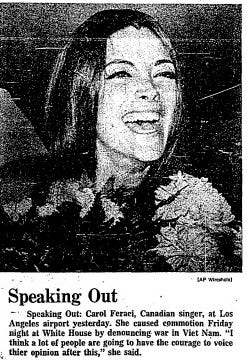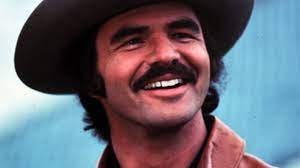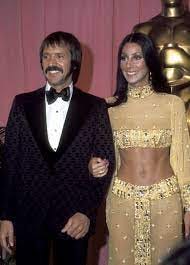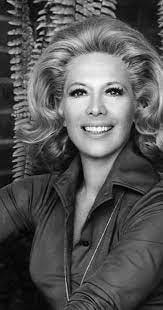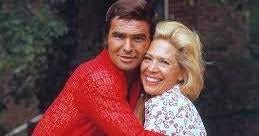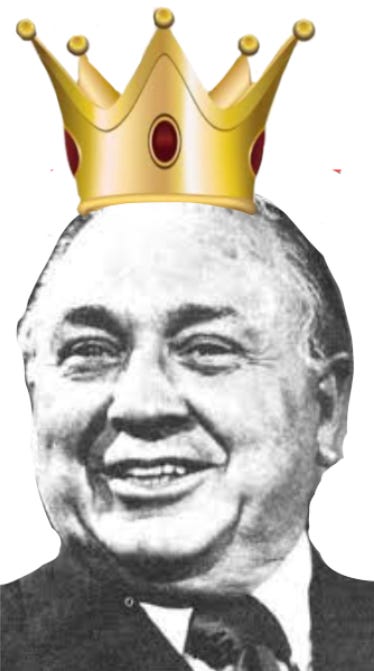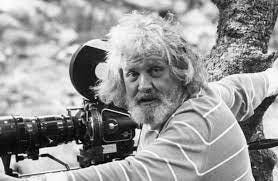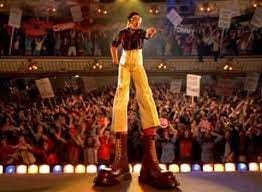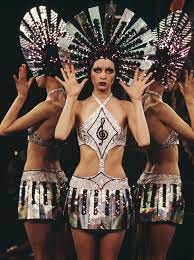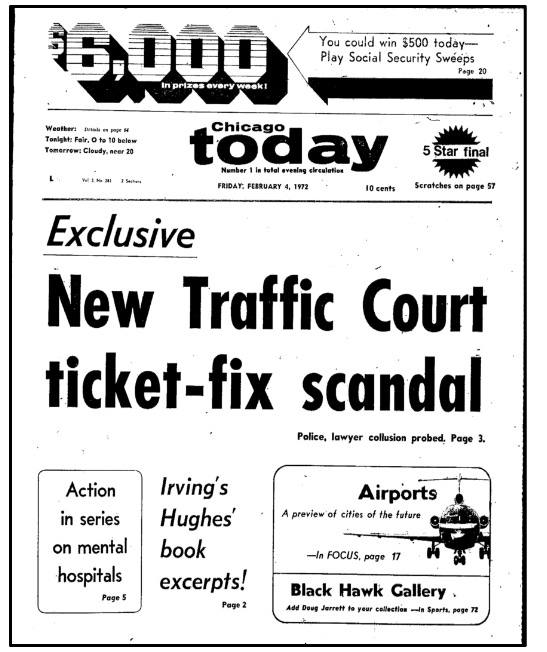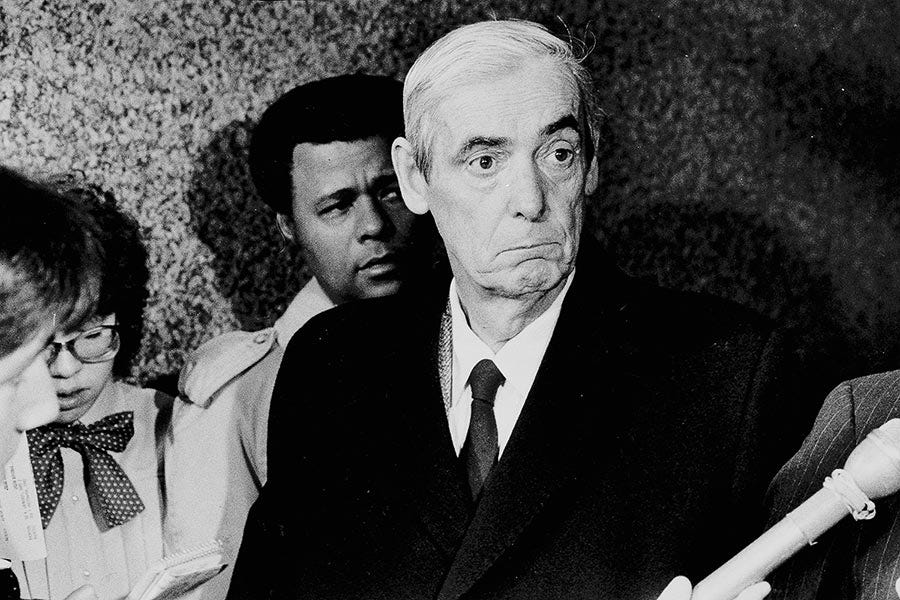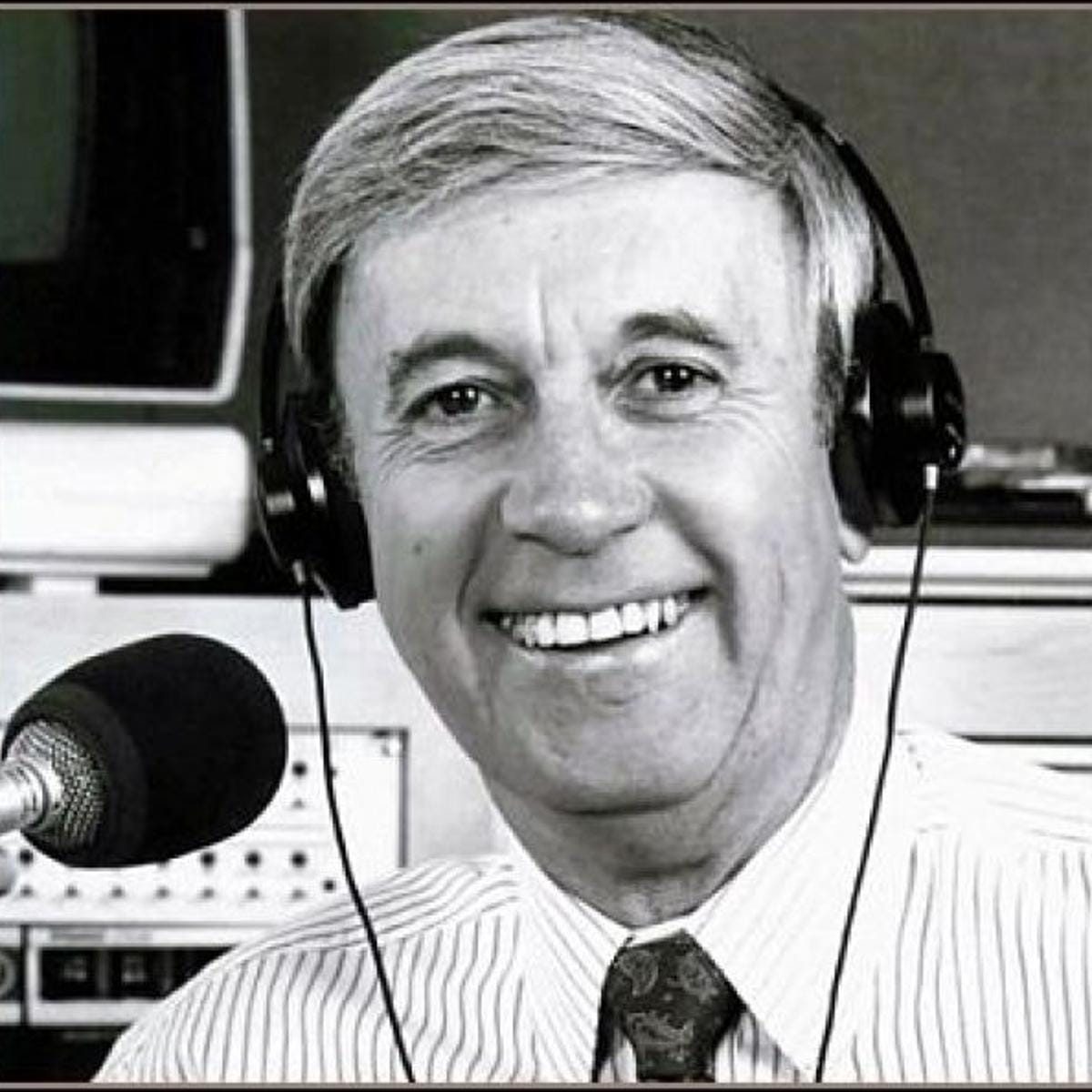THIS CRAZY DAY IN 1972: Chicago says goodbye to Mahalia Jackson, hello to a new Playboy Club
Weekly Compilation January 31-February 6, 1972
To access all site contents, click HERE.
Why do we run this separate item peeking into newspapers from 1972? Because 1972 was part of the ancient times when everybody read a paper. Everybody, everybody, everybody. Even kids. So Steve Bertolucci, the 10-year-old hero of the novel serialized at this Substack, read the paper too—sometimes just to have something to do. These are some of the stories he read. If you’d like, keep up with the 1972 papers every day on Twitter, @RoselandChi1972.
January 31, 1972
Chicago Tribune: Speaking Out
Remember Carole Feraci, who performed at the White House last weekend with the Ray Conniff Singers but first held up a banner reading "Stop The Killing", with Press Nixon sitting a few feet away?
Feraci is Canadian, living in LA. She was a star when she arrived back home at LAX from her D.C. appearance, which is what puts her in the paper today.
Feraci told the press at LAX, "I think a lot of people are going to have the courage to voice their opinion after this."
Perhaps so, but Feraci reportedly never got another professional gig again.
See the full post on Feraci's star turn here.
February 1, 1972
Chicago Today: Letter to the Editor, ‘How’s it going?’
Chicago Today reader Edward Detloff is not happy. It’s not that he’s unhappy with Chicago Today, but with everything else. I don’t know why he decided to complain to Chicago Today, but I could not stop reading his letter.
“After a depression and the various epidemics of the ‘20s and ‘30s, participation in a major war which was climaxed by a couple of atomic blasts, I thought things had to improve,” Detloff starts.
“However, world conditions remained bad. Our nation became involved in a police action and a couple of recessions, followed by a no-sense war which we are still paying for dearly.”
FYR: By “police action,” Ed means the Korean War.
“Crime and narcotics addiction have constantly risen, strikes are commonplace, the malcontents hijack airplanes, booby trap safety deposit boxes and even threaten to poison my water.” TCD readers will be familiar with all these recent 1972 calamities, the latter two happening right here in Chicago.
“There are constant bulletins about practically everything I eat, drink or smoke being harmful to me. The FDA took the hexachlorophene out of my antiperspirant so now I don’t know whether I was or am half safe.”
“I’ve been kicked out of school, shot at, bombed and strafed. I’ve been divorced, hauled into court, and held up by crooks at gunpoint. I’ve worked all my life and wonder how long I could stay in a private hospital if I had to.”
“Would you believe after all this, people still ask me ‘How’s it going, Ed?’”
--EDWARD DETLOFF
February 1, 1972
Chicago Today: Thousands at Mahalia’s ‘joyful’ 5-hour wake
By Michael Hirsley
“The queen of gospel singers lay still in a powder blue lace gown," begins Hirsley's coverage, which sets the scene better than if you were there.
“Above her coffin, in the octagonal dome of the Greater Salem Baptist Church, 63 plain light bulbs shone. One had burned out.”
“Double lines of visitors jammed the sidewalk east and west of the church entrance from Wentworth Avenue to Yale Avenue and a half block south on Yale.”
The crowd wound quietly through the church, writes Hirsley, as a soloist finished singing.
“Dr. Morris H. Tymes, pastor of the Greater Mount Moriah Baptist Church, 214 E. 50th, stood at the lectern above the coffin. As the people filed past below him, pausing briefly and looking sadly into the coffin, Dr. Tymes’ first words seemed loud and harsh.
“’There is nothing wrong with clapping your hands,’ he said. ‘This is not a sad occasion….We should be happy,’ he said. ‘Mahalia has won the victory.’ Now there was response, clapping and ‘Amen.’ ‘We’re black people and we’re emotional,’ he said. ‘Clap your hands! Clap your hands!’”
Next, gospel singer Evelyn Gay sang “Lord, Lord, going to love you till I die!” accompanied by organ and tambourine. “The rhythm thundered across the crowd and upward. Many were now singing. ‘Ain’t nothing wrong with noise if it’s joyful noise!’ Dr. Tymes shouted over the singing.”
Robert T. Johnson, who gave Mahalia Jackson her first singing lessons, sat behind the pulpit. “’You can’t ask if she was the best,’ he said. ‘There won’t be another Mahalia.”
Michael Hirsley’s both panoramic and intimate account of Mahalia Jackson’s wake at Greater Salem Missionary Baptist Church leaves no doubt that he’s both a reporter and a writer to the bones. So you won’t be surprised to hear that when Chicago Today folded in 1974, he moved to the Tribune and enjoyed a long distinguished career there. During the ‘70s through 1980, Hirsley wrote a column called “Close Up With Michael Hirsley” telling all kinds of personal stories.
Later, he moved to the sports section and focused on boxing. He retired in 2007.
In 2001, the Tribune’s Elizabeth Taylor introduced a Hirsley article on high-level checkers in the Chicago Tribune Magazine with this appreciation:
Mike came to the Tribune in 1974, fresh from covering the kidnapping of Patty Hearst for Chicago Today. Since then, he has demonstrated his versatility. He has been a metro reporter, Magazine writer and national correspondent based in Atlanta; he has covered everything from the opening of "Hair" and the Chicago Seven conspiracy trial to Pope John Paul II, Michael Jordan and Mike Tyson.
Mike now covers that special televised religion: sports. "Mike is probably the only sportswriter in America who was formerly a religion writer," says Associate Managing Editor/Sports John Cherwa, who praises Mike's wide-ranging abilities.
In the sports arena, he has written about everything from archery to his current beat, professional boxing.”
February 1, 1972
Chicago Daily Defender: Thousands in farewell salute to gospel queen
By Marion Campfield
Chicago Daily Defender: Thousands defy cold weather
By Marion Campfield and Lucille Younger
Mahalia Jackson’s visitation at Greater Salem Baptist Church, 215 W. 71st St:
“An estimated 8,000 mourners from all walks of life, from every section of the city and from out of town braved yesterday morning’s near zero temperature and sub-zero wind chill and slush to pay final tribute to ‘the voice that stirred the soul.’”
“They were the early comers. The 8,000 figure was expected to mount steadily as the 22-hour long visitation proceeded throughout the night….Miss Jackson started her internationally heralded career as a member of the church choir [at Greater Salem] 40 years go.”
“Some passed through the church, by the handsome, flower-banked bronze casket, and out again into the street, to stand around in sorrowing groups. Others found seats in the church’s spacious main sanctuary, as if reluctant to say a final goodbye.”
“Funeral services will be held in Arie Crown Theatre in McCormick Place, 23d st. and Lake Shore dr., through Mayor Richard J. Daley’s intervention, at 11 o’clock this morning.”
“She set my soul on fire,” said Mrs. Mattie Robinson, 6157 S. Kenwood, who made the pilgrammage in spite of her partial paralysis. Mrs. Robinson, who has to walk with the aid of a cane, was assisted into the church by Mrs. Pauline Martin of the Antioch Baptist Church Nurse Corps.”
“She was such a beautiful singer. She saved a lot of souls with her voice,’ remarked Evangelist Pauline F. Love. “Her halted voice has caused much sorrow on earth, but God is happy now.”
February 1, 1972
Chicago Daily News: Dorothy Manners column
‘Films, TV, stage keep Burt Reynolds hopping’
Remember Burt Reynolds? He was the bomb in 1972. Not as cool as Steve McQueen, but still. Dorothy Manners writes a gossip column that runs in the Everyday section of the paper. Today, she leads with Burt.
“HOLLYWOOD--It’s open season for Burt Reynolds. For the next two months he will be cavorting in three mediums: films (He recently finished back-to-back features, ‘Deliverance’ and ‘Fuzz’), television and a fling on the stage in Chicago, starring in ‘Nobody Loves an Albatross.’
“No wonder he is taking a short time out at his ranch in Florida…But the rest period won’t be long. He will be in Hollywood as a guest star on the Sonny and Cher Comedy Hour, and for the third time in New York, he will be host of a Tonight Show.”
“Then he works in a cameo role in Woody Allen’s ‘Everything You Always Wanted to Know About Sex,’ before heading for Chicago and a month’s run in ‘Albatross.’
“Don’t know how much time this leaves for Big D (as Burt calls the lady of his heart, Dinah Shore), but you better believe she’ll be around somewhere when he lands long enough.”
FYR: The Burt Reynolds-Dinah Shore romance was a huge deal, because Dinah hosted a top daytime TV talk show--but she was almost 20 years older than Burt. When they met, Reynolds was 35, and Dinah was 53. So think Demi Moore and Asthton Kutchner times two. Burt and Dinah were a couple for four years.
February 2, 1972
Chicago Today: Letters from our readers
‘Too bad, Arthur’
Chicago Today: Either the best editor for the letters section, or the funniest readers. They deserve their own logo.
Some things never change—Blackhawk fans hating on a Wirtz.
“I would like to wish Arthur Wirtz, president of our Black Hawks, a happy 71st birthday. I would like to purchase a gift, but am in a quandary over what to buy him. Mr. Wirtz really does have everything. He has the $9 box, the $7 mezzanine seat, the $1.50-a-shot bourbon, the 75-cent beer, the $3 parking tab [plus gratuity] and a captive [enslaved by their love for hockey] market for his inflated goods.
“I guess I could send Mr. Wirtz some money for his birthday. But then again, after going to Hawk games two weeks running, I’m a little short.
--WILLIAM E. CARSLEY”
February 2, 1972
Chicago Daily Defender: Weep for fallen gospel star
By Michael L. Culbert
“Sentiments of love, respect, worship and admiration overflowed from the ‘little’ people attending the service of famed gospel vocalist Mahalia Jackson yesterday morning.”
“A huge crowd, unable to gain entrance into the Arie Crown Theater in McCormick Place, waited behind closed doors for hours while the service was in progress…The service was interrupted several times with cries of ‘amen’ and shouts of grief as singers--among them Aretha Franklin, Robert Anderson and the Greater Salem Gospel Chorus--sang songs made famous by Miss Jackson.”
“Some mourners, overtaken with sorrow, had to be restrained by ushers and attendants clad in white dresses.” The accompanying photo shows seated in the front row: “Rev. J.H. Jackson, who delivered the eulogy; Mayor Richard J. Daley, entertainer Sammy Davis, Jr., who represented President Nixon; Mrs. Daley, Mrs. Coretta Scott King, Ella Fitzgerald, President Nixon’s aide Robert Brown, and New Crusader Editor Theodore Charles Stone.”
February 2, 1972
Chicago Daily News Editorial: To ground the skyjackers
Have you been wondering about all the nutty skyjacking in 1972, which everybody seems to consider just normal? Nothing you can do about it? The Daily News notes the FAA is taking some action.
“Eliminating skyjacking has always been possible; the sticking point was whether airline passengers would put up with the inconvenience necessary to keep prospective hijackers off the airplanes,” writes the Daily News editorial board.
That’s right. They had the technology to stop most hijackings long ago. But the airlines found it cheaper and easier to deal with the occasional--though as we see here in TCD1972, continual--hijackings.
“Now the Federal Aviation Administration has gone over the heads of both passengers and proprietors and directed the scheduled airlines to install by this weekend a more rigorous boarding surveillance system than has been in effect up to now.”
Read between the lines: There has not been an uproar among airline passengers tired of being hijacked, demanding that airlines do something to, say, keep guns off commercial flights. Because it would be inconvenient.
We’ll discuss in an upcoming Chapter Note that the only people really complaining were air line crews. But as we’ve seen in hijacking story after hijacking story just since we began this crazy feature in October, many times even the hijacked crew members take things in stride—like getting hijacked is just slightly worse than stepping in dog poop.
But: “[T]he FAA’s order falls considerably short of a comprehensive mandate, because it exempts foreign airlines and charter flights and does not require precautions at every boarding gate.”
Still, the Daily News concludes, the FAA mandate is worth a try. At least it includes metal detectors.
“We congratulate the FAA and hope the passengers will co-operate fully in what is essentially an effort to protect them from greater inconvenience and potentially great harm.”
February 2, 1972
Chicago Daily News: New Draft numbers!
Chicagoan watches draw--and winds up with No. 1
By William McGaffin
Tribune: March 6 Tops Draft Lottery
By Glen Elsasser
A draft lottery took place Wednesday, just like a state lottery ticket program works. It’s the fourth draft lottery, which started in 1969.
The draft lottery as always is for men who turn 19 in the calendar year. This time, “the most dreaded number, 1, was assigned to the birthdate of March 6. The most coveted draft sequence number, 365, was matched with the date of July 13.”
“Two members of the Selective Service Youth Advisory Committee, pulling capsules from plexiglass drums, matched each birthdate of the year with numbers ranging from 1 through 365…However the chances were that none of the 1973 draftees would be sent to Vietnam.”
The birthday capsules are red, the draft number capsules are blue.
Washington reporters apparently watched the lottery with a group of Georgetown students including Chicagoan Terry Barnich, who “glumly” watched his March 1 birthday get picked first. Barnich called his mom, Jenny, right away at their home at 13016 S. Marquette. “You’re kidding,” she said.
Terry Barnich told reporters he wanted to go to law school and into politics, so he figured he’d serve in the army eventually because “most political figures need a service background.” But he wasn’t planning on doing it right away, since he’s only a freshman.
“Barnich…was stunned. He said, however, he would not join the trek of draft evaders to Canada. ‘I’m going into politics, so I’ll probably join the Air Force R.O.T.C.,” he said.
On the brighter side, “he won the ‘ghoul pool’of $15 conducted among 30 classmates.”
I often wonder what’s become of people in these articles, but can’t always check. As it turns out, Terry Barnich did become a lawyer, and did go into government service. He was general counsel to Illinois Gov. Jim Thompson in the ‘80s. Thompson appointed him chairman of the ICC. Later, Barnich went to Iraq as a Deputy Director of the State Department office overseeing U.S. reconstruction projects in Iraq--though he’s also identified as a “private contractor” in that capacity.
Unfortunately this information comes from James Janega’s touching obituary article in the Tribune from May 27, 2009.
Barnich, just 56, was killed on Memorial Day that year “in a massive explosion as his convoy returned from a water-treatment plant being built near the war-ravaged town of Fallujah.”
“A resident of Chicago and deputy director of the Iraq Transition Assistance Office, Mr. Barnich had arrived in Iraq in the tumultuous early days of the surge led by Gen. David Petraeus…As others moved on or went home, he stayed as a shaky peace took hold, and remained even as it wobbled at the edges.”
“There were any number of obstacles to rehabilitating Iraq’s electrical-generation system. Even after insurgent attacks fell off, there were tribal rivalries to consider, local concerns and political divisions with the central government. For years, the American most at the center of that knot was a trim man with a marathoner’s physique and an understated sense of humor: Terrence L. Barnich.”
There were political kerfuffles along the way, but these seem the most important facts about Terry Barnich. I would add, he called his mother as soon as he heard about his draft lottery number in 1972. RIP.
Get more details and the full list of cool 1972 prizes here!
Get more details and the full list of cool 1972 prizes here!
February 2, 1972
Chicago Tribune: ‘Previewing’ the Playboy Club
by Stephanie Fuller
Chicago Daily News: Benefit Opens Playboy Club
By Margaret Carroll
A new upgraded Playboy Club is under construction in Chicago, and guess who’s eager to hold the first event there on opening night, March 10? The women’s board of the American Cancer Society’s Chicago chapter.
Daily News society editor Margaret Carroll and Tribune reporter Stephanie Fuller (no doubt among others) visit the new Playboy Club still under construction with the women’s board benefit committee members.
“The Beacon atop the Playboy Towers will be flashing red the night of March 10 to herald the opening of Chicago’s new Playboy Club,” writes Fuller. “Members of the women’s board of the American Cancer Society, Chicago Unit, will be spotlighted by klieg lights as they pass thru the main entrance on Walton Street.”
Literally, the women’s board could not spotlight more their support for a magazine and corporation built on pictures of naked women.
“Playboy bunnies yesterday served huge tulip glasses filled with champagne, bloody Marys, or screwdrivers to board members who gathered for a preview of the club,” Fuller continues.
“Plasterers working on the new Playboy Club had some distraction from their work yesterday. Cheryl Lee, the Bunny of the Year in 1971, posed in her gold bunny costume and ears with American Cancer Society benefit committee members” Carroll writes.
The photo didn’t reproduce well on microfilm, but frankly, the women’s board member posing with Bunny of the Year 1971 looks like she’s taking a vacation snapshot at a pornographic Disneyland with one of the roving characters.
Benefit chairman Mrs. Wayne Maxwell was not worried the club would not be finished on time, according to the Daily News. Mrs. Maximilian Schwartz, Mrs. Ronald S. Miller, and Mrs. Carl Devoe are all working on the $125,000 goal for the $100-a-couple party and dinner. In the Tribune, the style identifies the married women slightly differently. They are “Gigi [Mrs. Wayne] Maxwell, benefit chairman; Naomi [Mrs. Carl] Devoe, women’s board chairman; and Patricia [Mrs. Ronald S.] Miller, crusade chairman for the women’s board.
February 2, 1972
Chicago Daily Defender: Charlie Cherokee Says
“Now that the Rev. Jesse Jackson got his picture shaking hands with President Nixon, the speculation over who he will endorse for President becomes more relevant. The picture did not show what kind of handshake it was, soul-brother or standard. His partisans say that the kind of handshake doesn’t mean a thing. That soul handshake with King Richard during Black Expo is cited as an example.”
Sadly, I could not find a picture of the Jackson-Nixon handshake. But since Charlie often refers to Mayor Daley as King Richard—not that he’s the only one, it’s an obviously apt nickname—I have already prepared a King Richard photo:
And as we always remind Younger Readers: Yes, the Defender ran a political/society column titled “Charlie Cherokee Says,” starting in the ‘40s. It’s 1972, Jake. See the January 4 item here for more background.
February 2, 1972
Chicago Today: It’s easy to enter ‘horror house’
OMG, this is why I pop a Chicago Today reel into the microfilm machine: Reporter Pat Krochmal went straight-up Nellie Bly and checked herself into a mental hospital to report on the conditions.
Remember when reporters did things like this? Well, not you Younger Readers, but even Middle-Aged Readers do: the Mirage, anyone? By the ‘80s, people were starting to get squeamish and question the ethics of reporters inserting themselves into these situations. Mike Royko used a line this week that fits here, a term Steve’s boss Sol used to love: That’s thickly sliced baloney.
As an inset explains: “Illinois politicians for years have promised to move mental health care out of the Dark Ages.” In the latest fiscal year a record mental health budget of $332 million was approved. “Yet the state’s 25 psychiatric hospitals remain medieval houses of horror for some of their 20,000 residents. A CHICAGO TODAY Probe team spent five weeks investigating Chicago area mental health institutions. In the fourth of a series of reports, reporter Pat Krochmal tells of her ordeal as a patient at Chicago-Read Mental Health Center.”
In this installment, Krochmal wakes up in the middle of the night to find a man standing in the doorway watching her. “From what I could see of the half-vacant expression on his face, I knew he was a psychiatric patient,” she writes. She was too afraid to shiver. “All I could do was pretend to be asleep.”
“If I were in my own home, I might have acted differently. But I was a ‘patient’ in Chicago Read Mental Health Center and there was little choice. I could scream, but nobody would pay attention. Lynn, one of my four roommates, had been yelling thru hallucinations for at least half an hour earlier in the night and nobody came.”
Later, the intruder leaves and Krochmal leaves her room. Outside her room, a TV room is the center of the ward, where seven patients wandered around in the wee hours of the night: “Semi-dressed male patients were walking in and out of female patients’ rooms.”
February 2, 1972
Chicago Daily News: Ch 2 News ad for Bob McBride
Ch 2 won't stop its crazy ads for new anchorman Bob McBride, even though Mike Royko mocked Bob and the ads mercilessly already.
Here's today's ad, headlined "Don't Switch." A bit of the copy:
"Some people watching channel 2 at 10 PM have been getting up and switching channels to watch the news someplace else. Well, we have a new anchorman now. He stands head and shoulders above the other anchormen."
"One reason is that he's six foot three.
“Another reason is that the guy is pretty good.
“He's Bob McBride, an award-winning ex-television news director.
“We think he's a super-anchorman.
“But you'll never know it unless you see what he's like."
February 3, 1972
Chicago Today: Complete draft lottery numbers
Yesterday, two members of the Selective Service Youth Advisory Committee picked numbers out of a rotating drum to match each day of the year randomly with the numbers 1-365--as if they were presenting the day’s state lottery ticket drawing. But this is for the draft.
The lowest numbers get you drafted first. Every man turning 19 in 1972 is included in this round, the fourth since the draft lottery started in 1969.
FWIW, it’s believed nobody who gets drafted this year will actually get sent to Vietnam, since the U.S. is supposed to be getting out of the war. Although those secret talks in Paris don’t seem to have gone so well.
Chicago Today uses a whole page to show the draft number for each day of the year. March 6 is #1--so turning-19-year-olds born on March 6 are not going to have a great birthday in four weeks.
February 3, 1972
Chicago Daily News: Phyllis gets lift out of new face
By Sandra Pesman
Reporter Sandra Pesman gamely sits through an interview with Phyllis Diller that sounds like a string of bad Laugh-In gags, and probably were at some point.
“There was absolutely nothing wrong with my face that 11 incisions, hundreds of stitches, a complete eye job, extensive nose surgery, chin and cheek lifts couldn’t fix. AH!...HA!...HA!” The frequent elipses in a Phyllis Diller quote signify long, dramatic pauses. The last part is a pretty accurate oral transcription of a Phyllis Diller laugh, which functions as her punchline.
Younger readers: Believe it or not, Phyllis Diller was a very successful stand up comedian.
The 54-year-old Diller did all that plastic surgery in one sitting so to speak, at a cost of $4,000 and six weeks of healing. Pesman appears to sincerely feel that Phyllis Diller’s new face is quite attractive. She asks how that will affect Diller’s act, which is built entirely around being ugly.
“I’ve always been able to put on a funny dress and a terrible wig and get laughs--and I still can,” she said. Pesman asks Diller “what her new beauty has done for her sex life and she starts whooping and hollering again.”
“’My dear!’ she said with those terrific pauses. ‘My sex life…has always been…mar-ve-lous!’
‘With both husbands?’
‘Weeeel, it wasn’t so hot with the first one.’
‘But you had all those kids…’
‘Hmmm. That’s right. Well, he liked it! AHA…HA!...HA!’”
February 3, 1972
Chicago Daily News: Gibron’s search turns to coaches
By Jack Schnedler
“Having surveyed the results of his first college player draft and pronounced them good,” new Bears coach Abe Gibron “flew back to Chicago to begin wading through the 100-plus applications he already has received for the six assistants jobs.”
Gibron tells a press huddle he’ll start making calls on Thursday, “simultaneously demolishing a hefty wedge of blueberry cheesecake in five bites from a standing position.”
There’s going to be a lot of jokes about Gibron’s weight, which will only shock anybody who didn’t grow up watching The Honeymooners, live or in reruns. Different times! Remember, Jack Schnedler isn’t typing on a laptop in a coffee shop, never running into Gibron in real life. Schnedler frequents the Bears offices and behind-the-scenes at Soldier Field constantly, physically meeting with and talking to Abe Gibron all the time. Whatever Jack Schnedler writes about Abe Gibron, he knows he’ll have to see Gibron again and answer for it soon, if not the next day. So these jokes are not offensive in 1972, even to Gibron. Reporting on Gibron getting Jim Dooley’s old job on Jan. 27, Schnedler wrote, “Gibron, who ranks among the fattest as well as the most widely respected men in professional football, inherits a team that lost its last five games in 1971 on the merits of a truly dreadful offense.”
I was lucky enough to make contact with Jack Schnedler this week, and he elaborated on the cheesecake incident: Abe Gibron “emerged from the Bears' draft room to tell us about his latest pick while devouring a huge chunk of blueberry cheesecake held in his left hand. His rhythm was talk, chomp, talk, chomp, talk, chomp ...”
Gibron says he’s focusing on offensive staff. “That’s where we have to build.” And he’ll “look favorably” on former Bears, though he won’t comment on specific names. He’ll talk to any of the old coaches who’d like to, but he says he wants to change the Bears’ image.
“With everybody saying it was a poor year for talent, we did a good job,” Gibron summed up the Bears’acquisitions, which started with offensive lineman Lionel Antoine (No. 3 in the draft) and ended with defensive back Laverne Dickerson, the 427th man picked. In between, the Bears apparently took strides under Gibron’s theory of drafting the best prospect available regardless of position.”
Jack Schnedler’s snappy, fun writing and obviously thorough knowledge of the Bears office makes reading the Daily News Bears coverage a pleasure, so it was great to touch base with him this week. Here’s a little background he provided:
“I was blessed to be hired by The Daily News in January of 1965 at age 21. I was a green-at-the-gills cub reporter, then covered education for close to a year before winding up in the Vietnam-era U.S. Army in January 1967. I was summoned for rewrite on the day in 1966 that Richard Speck murdered the eight student nurses.
“My wife Marcia and I spent the better part of two years (1972-73, then 1976-77) traveling overseas, mostly in Europe. I was a writer and editor for The Daily News Panorama magazine (1973-1976), and finally the paper's deputy city editor from June 1977 until the paper closed on March 4, 1978. I claim to have edited the last piece of local copy for The Daily News.”
February 4, 1972
Chicago Daily News: ‘The Boy Friend’ great fun
By David Elliott
Sometimes it’s hard to tell, but Daily News movie critic David Elliott definitely likes the new Twiggy movie, which is also the new Ken Russell movie:
“[T]his exuberantly shallow and self-conscious movie really is the return of something special,” Elliott writes. “Ken Russell’s version of Sandy Wilson’s affectionate tribute to the musicals of the 1920s is an extraordinary tutti-frutti lollipop, always frivolous and at times fantastic.”
Director Ken Russell’s name was already an adjective meaning “flamboyant,” often not in a good way. Google sources all say Russell’s best known film is “Women In Love,” a D.H. Lawrence adaptation, but I would have said the movie of The Who’s “Tommy,” for Elton John’s appearance alone. Probably what’s best known among critics is not the same as what’s best known among average movie goers.
More review: “As always, Russell is excessive, but this time it’s lovable excess…Like [her character] Polly, Twiggy cannot dance, sing or even act with any special authority. But she has a sweet piping voice and buckets of charm, and at first glance you know there’s no one else quite like her, that she’s more than a fizzy Ruby Keeler poured through a thin straw of Audrey Hepburn.” (FYI, Twiggy has said in earlier interviews that she trained intensively in dancing and singing for six months for this film. She is replacing Julie Andrews, who played this part in the stage version. Perhaps Twiggy trained to sing and dance as if she can’t sing or dance, as opposed to training to sing and dance.)
I enjoyed the quite long preview Apple TV shows for free, though I’m not sure I have the stomach for much more. The movie costs $4.99 to buy, $2.99 to rent. I don’t think you’d see it any other way, because I never see this movie in the cable listings.
FYR: Who the heck is Twiggy? She singlehandedly made being starvation-thin all the rage in the late ‘60s as the most famous super model of the time, and now she wants to act.
See previous Twiggy appearances in TCD1972 HERE on Dec. 2, 1972 and HERE on January 5, for her inclusion on Mr. Blackwell’s worst-dressed list for 1971.
Roger Ebert will review “The Boyfriend” too, but not until Feruary 8.
February 4, 1972
Chicago Today: Traffic Court rocked by ticket fix scandal
By Robert Glass and Jack Queeney
Chicago Today says it’s got an exclusive: Several investigations show cops, lawyers and bailiffs collude to fix tickets in Chicago Traffic Court. Suspiciously, the state’s attorney office has lost 32 of 36 drunk driving cases in January--including a case where the defendant’s blood alcohol was twice the legal limit.
Apparently Sheriff Richard Elrod, the Circuit Court and the State’s Attorney are all investigating. Elrod confirms six bailiffs have been disciplined, with two “asked to resign’. Twelve cops have been reported to the Police Department “for investigation,” and two lawyers reported to the Chicago Bar Association.
“Defendants arrested for serious traffic offenses…would go to Traffic Court without a lawyer. Bailiffs or clerks would refer them to certain lawyers, saying that those lawyers could ‘keep them out of jail.’…Lawyers allegedly then paid the arresting officers to ‘lie down’ on their testimony, that is, give testimony that could be used to gain acquittal”.
Lawyers paid the cops and bailiffs outside court, and payment was “never made for any specific case. Instead, lawyers would pay policemen whenever they met, hoping that the officer would ‘remember’ the next time he appeared in court against one of the lawyer’s clients.”
“Presiding Traffic Court Judge Richard LeFevour, who took over when Judge Raymond K. Berg resigned last December to run for state’s attorney, said no judges were involved in any ticket fixing.”
Yes, THAT Judge Richard LeFevour.
FYR: Judge LeFevour is going to get into some very big trouble, quite soon.
February 5, 1972
Chicago Daily Defender: National hotline
By Diggs Datrooth
“WASHINGTON—Rep. Shirley Chisholm is in the minds of black Americans and many women in the Women’s Movement as Our Candidate, but after her announcement of her candidacy for the Presidency she declared: ‘I am not the candidate of Black America, although I am black and proud. I am not the candidate of the Women’s Movement of this country, although I am a woman and equally proud of that. I am not the candidate of any political bosses or special interests.”
“At the late-in-January meeting held at the Concord Baptist Church in Brooklyn Mrs. Chisholm revealed that she had received $44,000 ‘from the American people’ and had definitely decided to run in the primaries in Florida and North Carolina.”
February 5-6, 1972
Chicago Daily News: Movie listings
February 5-6, 1972
Chicago Daily News, Insight column: As American as “American Pie”
By Henry Hanson
Today the Insight column, generally used for in-depth looks at important issues, is devoted to Don McLean’s hit single, “American Pie.” Let the “American Pie” insanity begin!
Henry Hanson examines “American Pie” by first examining how everybody else is examining the hell out of this song.
“People are never satisfied until they’ve destroyed whatever magic they found in the first place,” Hanson quotes McLean in the lede, “And I believe in magic.” McLean believes in soundbites, too, apparently.
Second graf, Hanson sums up the “American Pie” phenomenon perfectly:
“McLean is the long-haired, guitar-strumming, pop-rock-folk-singer-songwriter who ripped out of left field into the big time with a single hit— ‘American Pie.’ Not in recent musical history has a song been so dissected and analyzed by critics, by disk jockeys, juke box boppers and parlor game addicts.”
The most ridiculous media quote Hanson includes is from Newsweek: “It is an elegiac, rocking Remembrance of Things Past, from paper routes and sock hops in the gym to the dashed hopes of Woodstock.”
The entire lyrics are reproduced.
You can read “American Pie” analysis all over the internet. I’ll just add this: You can bet Wally Phillips played the heck out of “American Pie,” in between Ellery Queen and commercials and callers and the traffic helicopter.
Do you dig spending time in 1972? If you came to THIS CRAZY DAY IN 1972 from social media, you may not know it’s part of the novel being serialized here, one chapter per month: “Roseland, Chicago: 1972” —FREE. It’s the story of Steve Bertolucci, 10-year-old Roselander in 1972, and what becomes of him. Check it out here.
AND SUBSCRIBE FOR FREE!





